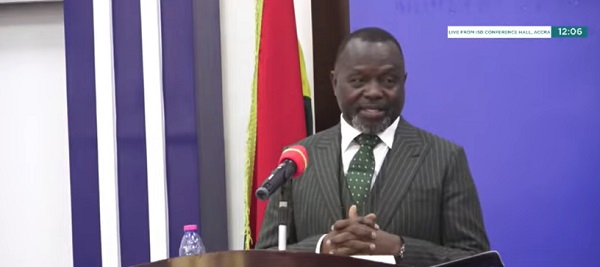Over 5,500 delegates gathered under clear skies at the University of Ghana Stadium for the New Patriotic Party’s (NPP) National Delegates Conference – an event that was billed not just as a constitutional meeting but as a test of internal coherence.
Despite the headline message, “Rebuilding Together with Our Values,” the 59 motions presented for constitutional amendment revealed deeper frictions about governance, campaign control, and fairness within the party’s structure.
IMANI Africa, the policy think tank, has raised sharp questions about four key motions passed at the conference, arguing that while reform is welcome, several proposals suffer from a lack of procedural clarity and political foresight.
“In the end, two of the motions were rejected: motion 17 to empower individuals other than polling station, electoral area and constituency officers to supervise polling station and electoral area elections; and motion 54 to redefine ‘youth’ to conform to global age benchmarks (15-35 years) instead of the age limit of 40 years provided in the constitution”
IMANI Africa
One of the most consequential motions, Motion 10, seeks to bar any party officer appointed to a government position from retaining their party role. The logic is clear: reduce conflicts of interest and promote internal equity.

However, IMANI pointed out that the motion was passed without a framework for replacing these officers. The party constitution – specifically Articles 10(2)(7)(b), 9(27)(e), and 7(29)(e) – does provide mechanisms for filling vacancies, but referencing them in an evolving document has introduced ambiguity.
“Without a clear trigger and timeline, a vacated position could remain unfilled for months,” IMANI Africa stated in its review, offering that a more robust approach would specify that an officer appointed to public office must vacate their party position within 14 days and “a by-election be convened at the next tier-level meeting.”
This, IMANI argued, would ensure continuity and prevent strategic delays in filling key positions.
Steering Committee Composition and Candidate Resignations
Another critical issue emerged from Motion 39, “which amends Article 10(10) to remove the sitting President from the party’s National Steering Committee.” The intention is to reduce executive interference in party matters.
But as IMANI noted, this raises a dilemma when the sitting President is also the party’s flagbearer for an upcoming election. “Will the President be excluded from campaign strategy discussions? Or will he be included as flagbearer but denied decision-making power?” The think tank queried, recommending a more nuanced solution.
“The sitting President shall serve on the Steering Committee in ex-officio, non-voting capacity when also serving as party flag-bearer. This preserves institutional checks and balances while allowing the President to contribute strategic insight without wielding undue voting power”
IMANI Africa

Motions 43 and 46, which deal with the resignation timelines for aspirants to parliamentary and presidential positions, also drew criticism. These amendments now require ministers and CEOs of public institutions to resign 12 or 24 months ahead of elections.
However, IMANI pointed out that the motions omit regional and constituency officers and leave undefined what constitutes “filing to contest. Does it mean a public declaration of intent, or actual submission of forms?” the organisation asked.
It noted that aspirants could exploit this vagueness to maintain influence until the last possible moment. Additionally, the exemption of first-term Presidents and Vice-Presidents from these requirements skews the internal playing field.
To resolve this, IMANI proposed that “file to contest” should be clearly defined as the formal submission of nomination forms to the Party Elections Committee. It also added that all party officers – whether national, regional or constituency – should also be included in the resignation requirement.
Additionally, the deadline should be pegged to either the close of nominations, 14 days after filing, or post-primary confirmation.
Flawed Voting Method
The method used to vote on the amendments – voice affirmation – also drew concern across the party and civil society. “Under Article 19(c), constitutional amendments require a two-thirds majority,” IMANI reminded.
“Yet in a cavernous stadium echoing with thousands of voices, it is impossible to audibly distinguish whether that supermajority has been reached. Party members have expressed their frustration with voice votes”
IMANI Africa

Without digital voting or visible tallying, the legitimacy of these motions hangs in the air. IMANI advised that a party committed to internal democracy would do well to adopt a digital ballot with real-time results moving forward.
Such a move, they argued, would uphold the standards of democratic accountability the party claims to champion.
As the dust settles from the conference, IMANI has called for a constitutional review panel to refine the vague clauses passed and establish standards for future amendments.
“This panel would be tasked with refining vague amendment clauses – particularly those regarding officer replacement, resignation triggers, and leadership roles – and codifying a verifiable voting mechanism, such as digital balloting or division voting”
IMANI Africa
Without such measures, IMANI maintained, the party risks inviting disunity under the guise of reform. With winning the 2028 general elections as the prize, the NPP faces a crucial test: can it align its internal governance with its broader political ambitions?
The reform agenda is a step in the right direction, but without clarity, consistency, and transparent implementation, the party may find itself mired in the very dysfunctions it seeks to overcome.
READ MORE: Fidelity Bank, Partners Unveil BoseaLoan to Deepen Financial Inclusion in Ghana




















